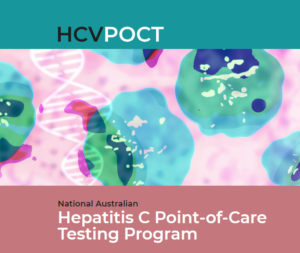Research
Get involved in a research program to advocate for POCT or to introduce POCT in your setting. The following research programs are exploring the use of POCT for hepatitis C.
 The Kirby Institute and Flinders University International Centre for Point-of-Care Testing
The Kirby Institute and Flinders University International Centre for Point-of-Care Testing
This program is establishing a network of sites to scale up point-of-care hepatitis C Virus (HCV) RNA testing in settings providing services to people at high risk of acquiring HCV infection. These sites will be in a range of healthcare settings and will be sufficiently broad to enable engagement across all priority populations, including people who inject drugs and/or are accessing drug treatment programs, people who previously injected drugs, people in custodial settings and Aboriginal and Torres Strait Islander people.
The goal of the project is to test the value of POCT using the Xpert fingerstick assay in reducing the prevalence of HCV.
Find out more or sign up on the program’s website.
 The TEMPO Study is a randomised clinical trial led by the Kirby Institute, UNSW Sydney in collaboration with partners across Australia including other researchers, state community organisations and state health services.
The TEMPO Study is a randomised clinical trial led by the Kirby Institute, UNSW Sydney in collaboration with partners across Australia including other researchers, state community organisations and state health services.
This project aims to evaluate two strategies of hepatitis C virus (HCV) testing compared to standard of care among people who inject drugs at needle and syringe (NSP) or clean needle (CNP) program services in Australia, to see if it can improve the number of people who start treatment following an HCV diagnosis with 1) HCV testing from collected dried blood spots sent to a central laboratory; 2) HCV testing using a point-of-care device at the NSP / CNP site, or 3) HCV testing using standard of care at the NSP / CNP site.
If you’re interested or require further information, please contact the lead Principal Investigator, Prof Jason Grebely at [email protected], or the TEMPO Project Coordinator, Elise Tu at [email protected].
The Burnet Institute
The QuickStart Study explores the impact of using rapid POC hepatitis C (antibody and RNA) tests to provide people with a quicker diagnosis and treatment. The study is a cluster cross-over randomised controlled trial set in primary care settings that deal with a high HCV case load.
The trial aims to test whether different models of POCT that reduce the number of visits to a healthcare service impact the numbers of people starting treatment and being cured of HCV. The trial tests three models of POCT:
- HCV rapid antibody testing alone followed by standard community-based treatment.
- HCV rapid antibody and rapid RNA test followed by standard community-based treatment.
- Same-day HCV rapid antibody testing followed by treatment initiation model.
These approaches will be compared with a control group, which offers the standard HCV management approach, requiring multiple diagnostic and prescribing visits.
Find out more or sign up on the program’s website.

